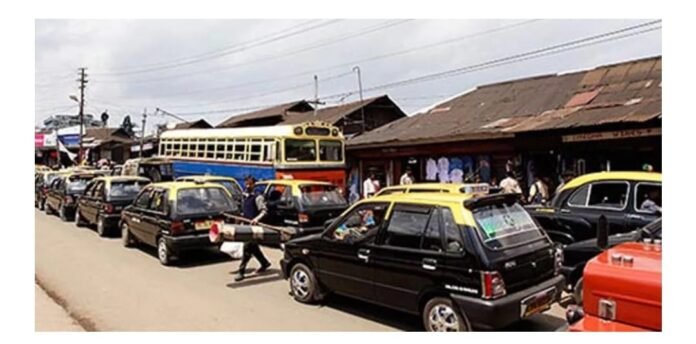In a recent turn of events, the East Khasi Hills Local Taxi Welfare Association (EKHLTWA) in Shillong, Meghalaya, has made a significant announcement that has stirred up conversations and generated concerns within the local community. The association has declared its intention to boycott non-local cab drivers operating within the city, citing various reasons behind this decision.
The EKHLTWA, a prominent organization representing local taxi drivers, argues that the influx of non-local cab drivers has had a detrimental impact on the livelihoods of the local taxi operators. Non-local drivers, they claim, often offer lower fares and operate without adhering to the local regulations and requirements that local drivers must comply with. This unfair competition creates an uneven playing field and threatens the sustainability of the local transportation industry.
One of the key points raised by the association is the significant investment made by local cab drivers. These drivers have devoted substantial resources, time, and effort into acquiring permits, licenses, and vehicles to provide taxi services exclusively within Shillong. The emergence of non-local drivers, who circumvent these regulatory measures, poses a direct challenge to the local drivers’ ability to compete fairly.
Furthermore, the EKHLTWA expresses concerns about passenger safety and security. They argue that non-local drivers may lack familiarity with the local geography and road conditions, potentially compromising the safety of passengers. In addition, they raise issues related to accountability, as non-local drivers may be less inclined to adhere to local traffic rules and regulations.
The decision by the EKHLTWA to boycott non-local cab drivers has triggered a spirited debate within the community. Supporters of the association assert that safeguarding local livelihoods and maintaining standards are paramount. They emphasize the need to protect the investments made by local drivers and ensure a level playing field in the transportation sector. On the other hand, critics voice concerns about potential disruptions in transportation services. They argue that such a boycott could limit transportation options for residents and tourists, leading to inconvenience and potentially tarnishing the overall image of Shillong as a tourist destination.
In light of the growing debate, authorities are now being called upon to mediate and find a solution that addresses the concerns of both the local taxi drivers and the public. Striking a balance between the interests of all stakeholders while ensuring fair competition and passenger safety will be crucial in resolving this contentious issue.
As the situation unfolds, it remains to be seen how the local government and concerned parties will respond to the EKHLTWA’s boycott announcement. In the coming days, discussions, negotiations, and potential policy changes may shape the future landscape of Shillong’s taxi industry.
One possible approach could be the implementation of stricter regulations and enforcement mechanisms for non-local cab drivers. This would ensure that they comply with the same standards and requirements as their local counterparts, thereby leveling the playing field. Additionally, measures could be put in place to enhance passenger safety, such as mandating that non-local drivers undergo orientation and training programs to familiarize themselves with the local area.
Moreover, engaging in constructive dialogue between the EKHLTWA, non-local drivers, and relevant authorities is essential to understanding the concerns of all parties involved. This dialogue can facilitate the identification of common ground and the formulation of mutually beneficial solutions.
Finding a resolution that addresses the concerns of the EKHLTWA and ensures the availability of reliable transportation services in Shillong is of utmost importance. By considering the perspectives of all stakeholders, implementing effective regulations, and fostering collaboration, it is possible to strike a balance that supports the livelihoods of local drivers while meeting the transportation needs of the community.


